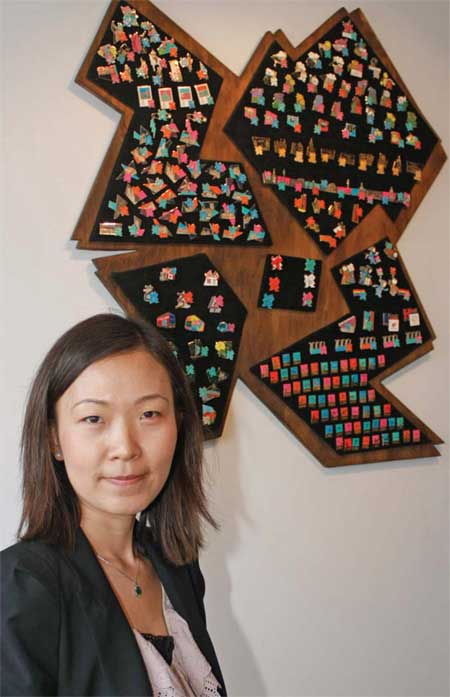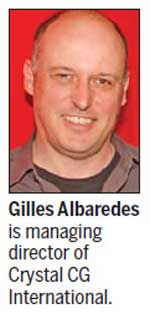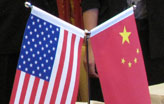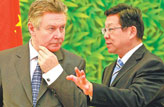Companies
Olympic-sized business, one step at a time
Updated: 2011-07-22 11:09
By David Evans (China Daily European Weekly)
 |
|
Betty Wang, chief representative officer of Honav UK Ltd, an official supplier to the London Olympics. David Evans / for China Daily |
Chinese companies burdened by bureaucracy and culture when setting up operations in london
The cutting of a red ribbon by Chinese Premier Wen Jiabao at the MG car plant in the United Kingdom recently was an act of symbolism designed to endorse the strong business link between the two nations.
Amid the fanfare of Wen's June visit, it was announced that the UK and China had signed 1.4 billion pounds (1.6 billion euros) worth of trade deals. Britain's pharmaceutical, green tech, financial services, porcine and poultry industries were among the big winners. Much has also been made of Chinese companies looking to "buy British" by investing in established brands that can be marketed back home - MG being a prime example.
Yet away from the headline-grabbing numbers and industries, there are a number of Chinese small- and medium-sized enterprises (SMEs) already thriving from a one-off cross-border trade agreement that sees Britain benefiting greatly from expertise in industries such as manufacturing, design, new media and technology. It is in an area in which China has already had huge success, but where the UK has not ventured since 1948 - the Olympic Games.
The showroom of Honav UK Limited is like any other you'd find attached to a factory in China's Pearl River Delta or at a head office in Beijing. It's small, and has the company's products arranged on shelves and as wall displays. Honav's speciality is lapel pins and as an official supplier to London's 2012 Olympic Games, the miniature artworks feature all manner of things British.
From London buses to Mallard ducks, it's a romantic snapshot of how the Games' organizers would wish the country to be perceived by visitors - friendly, traditional and slightly eccentric. After all, what 21st Century nation would hold up a red-and-white striped wooden deckchair, known for collapsing under the slightest pressure, as a national icon?
What's different about this showroom, however, is that it's not located in the industrial landscape of Guangzhou. Instead it is in a redbrick former warehouse in London's rejuvenated Docklands, a stone's throw from the headquarters of The London Organising Committee of the Olympic games, or LOCOG.
Betty Wang, chief representative officer of Honav UK Ltd, is the only Chinese expatriate in an office of 13 full-time staff. Written into the contract to supply official Olympic merchandise was the proviso that the company set up a London office, which it did in 2008. For Wang that meant relocating from Beijing in what was her first overseas posting outside Asia.
 |
"Trust me, it was a big challenge. It was also the first overseas project for the whole group. We didn't know much about how to operate overseas projects, the local culture, people's mentality. Market rules and policies are completely different. Even when we opened the office we didn't know how to do the refurbishment, or about health and safety, that is something completely different from China. So details like that, it was a learning curve for our company. We wouldn't be here if we hadn't won the contract for the Olympics, that's for sure."
While Wang is at pains to stress this is not meant as a criticism, it does reflect the reality facing Chinese SMEs setting up in the UK - the two biggest obstacles being bureaucracy and culture.
London is a major destination for foreign direct investment (FDI) from China into the UK, and Europe. Figures from local government promotion agency London & Partners reveal that it helped 29 companies choose to set up or grow their business in the capital in the financial year 2010-11. It also said that of the 450 Chinese companies operating in the country, 250 were in London. A big draw is the 2012 Olympics, and the agency has helped 83 firms from China since London was awarded the Games in 2005.
However, there are those who believe much more could be done to open up the UK to greater FDI - particularly from SMEs - who can find the cost and paperwork of establishing an office in the UK prohibitive.
In a speech to the London Chamber of Commerce's Chinese Business Association in May, Jeremy Oppenheim, national lead for temporary migration at UK Border Agency (UKBA), said limits to the number of workers arriving from outside the European Economic Area were not applied arbitrarily. He said this fact should give confidence to Chinese firms already established in the UK as well as businesses in China.
Yet Peter Bishop, deputy chief executive of the London Chamber of Commerce and lead on the Chamber's Chinese Business Association, says the level of bureaucracy is still too high.
"Certainly we support UKBA in their quest to make sure we are attracting the brightest and the best, but the feedback we are getting is that application forms are too long and complicated, it's very difficult to get online appointments, which means you have to apply in person, and you can do it through a third party, but it just adds to the cost. There is feedback that there are gremlins in the system and we can't ignore them and the London Chamber is preparing a case to say we have to lower this barrier," he says.
Among the official suppliers to the Games is the firm behind the opening visuals in Beijing 2008, technology company Crystal CG International. In 2009, Crystal was appointed the Official Digital Imaging Services Supplier to the London 2012 Olympic and Paralympic Games. According to managing director Gilles Albaredes, his firm's success in Europe is down to a policy of recruiting local talent. For this he credits company founder Lu Zhenggang.
Sitting in the company's central London office, the Frenchman describes Lu as one of China's younger generation of business entrepreneurs - savvy operators eschewing the brash excesses of the country's nouveau riche. He says travelling economy is not beneath Lu and when in London, he stays at a budget hotel chain.
Albaredes recognizes there is a cultural difference that stops many SMEs setting up in London. Indeed, he and his chairman converse through an interpreter. Yet, he says, this should not be a barrier.
"I've always worked for American companies and it was always very different with the Americans. They establish a management team, which originates from headquarters and they grow the business by hiring a mix of local talent and also bringing in more people from the US.
"At Crystal we did it very differently. There was a group of people from headquarters that came for 18 months and looked at the market, established high-level business relationships, and managed the business for winning the London 2012 supplier agreement. But relatively quickly, the chairman decided to establish a management team that was European. The policy we have here is that we recruit local talents who understand the market dynamics and have had a track record in the local market," he says.
"When I was in Beijing as part of the selection process Mr Lu told me: 'We want to learn from business practices undertaken by senior managers and creative people in the Western world'. And he was quite eager to learn, and the learning element is something he repeats quite often and with a passion. This passion, he has it in China as much as we do here, and they really want to learn from us. But obviously we are learning a lot from them. So it's this exchange that he's interested in, as opposed to imposing his best practices into Europe."
The Olympics is bringing in Chinese SMEs from the less traditional sectors such as the creative and multimedia industries. Joining Crystal and Hanov in London & Partners 100 Companies to watch is design consultancy LKK, online game developer Changyou.com, and stadia equipment manufacturer Shanghai Haobo.
But these companies are in the UK not just to sell their products, says Tom Troubridge, chairman of the China Business Group at PricewaterhouseCoopers.
"One of the issues they have with their domestic market is a shortage of innovative products, brands and service offerings. A lot of these Chinese companies are looking for Western products, brands and services to take back to the China market," he says. "I think what we are going to see over the next 5-10 years is a growing interest from China and not because they are looking for organic growth in Europe, but what they are going to find is a pipeline of good quality products and services to take back to their growing domestic market."
Crystal is here for the long-haul, asserts Albaredes; while Wang says Honav is concentrating on the project in hand.
So while the Olympics might prove attractive to China's SMEs - especially those from the creative and media sector - the city's long-term attraction won't become apparent until the last athlete has gone home.

Specials

China-US Governors Forum
The first China-US Governors Forum is held July 15 in the Salt Lake City, the United States.

My China story
Foreign readers are invited to share your China stories.

Rare earths export quota
China kept its export quota at almost the same level as last year.